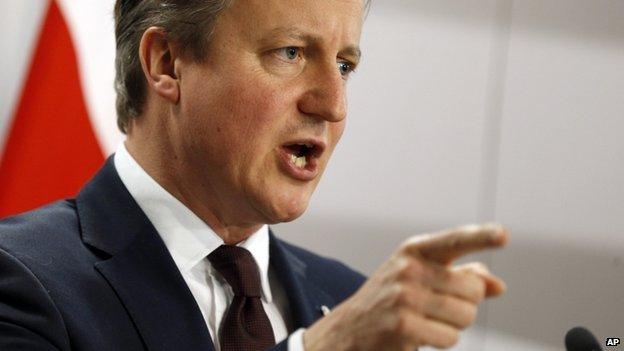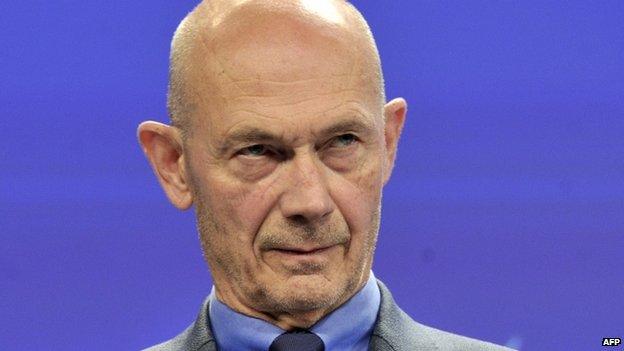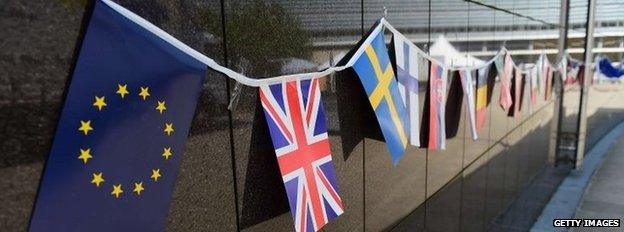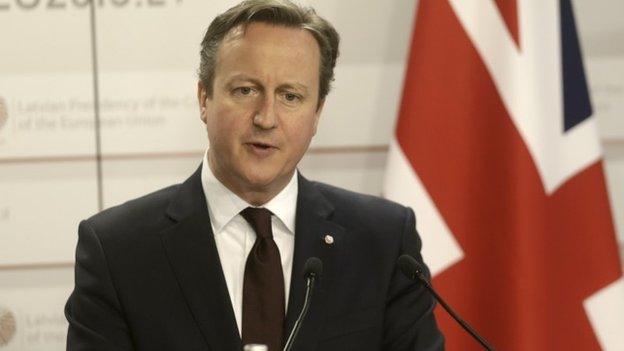Pascal Lamy urges PM to make positive case for EU
- Published

David Cameron is being urged to make a positive case for Europe if he wants to successfully renegotiate the UK's terms of membership with fellow EU leaders.
Pascal Lamy,, external one of Europe's most senior politicians, told the BBC other leaders wanted to help Mr Cameron win a referendum but he had to help himself.
The PM has pledged to renegotiate a "better deal" for the UK and hold an "in/out" referendum by the end of 2017.
Meanwhile, the Labour Party has dropped its opposition to an in/out referendum.
Acting leader Harriet Harman said her party had "reflected on the conversations we had on doorsteps" during the election campaign and changed its position.
Mr Lamy was director general of the World Trade Organization for 13 years.
In an interview to be broadcast on BBC Radio 4's The World This Weekend later, Mr Lamy - who now heads up the think tank Notre Europe - said he did not agree with the view "that the Brits have always been a pain in the ass so they can leave and it would be fine".
He said the prime minister started with some credit because of his election victory.
"[David Cameron] won an election in a reasonably brilliant way as a politician, as a professional of politics he did a good job and these guys are in the same job and they recognise that", he said.
"There are issues of substance, but the psychology of that matters very much."

He warned there would be some red lines, such as free movement of people but there was a "margin of manoeuvre" over this and exempting the UK from "ever closer union".
He suggested Mr Cameron's tone would be important.
"Most European leaders, including myself, feel David Cameron needs to be able to make a good case for Europe in the referendum.
"They need to help them but he himself must make a pro-EU case in the UK, which frankly hasn't been done for the last 15 years.
"There has to be some change to the UK narrative, which will probably be the price for a compromise."
'Two miracles'
Mr Lamy said if Britain left, it would be bad news for the EU.
He said in his previous jobs, he found world leaders, like the presidents of China and Brazil, felt the EU was founded on two miracles - peace between France and Germany, and British membership.
"Half of the miracle would evaporate if the Brits were to leave the European Union," he added.
On Friday, the prime minister admitted he has not found himself surrounded by a "wall of love", as he put it - but he will find Europe's leaders are willing to help him construct a ladder to hop over the high fence he has built for himself.
Labour's Harriet Harman has also said her party would now support David Cameron's planned referendum bill, clearing a path for a ballot by the end of 2017.
Writing in the Sunday Times, external, Ms Harman said: "We have now had a general election and reflected on the conversations we had on doorsteps throughout the country. The British people want to have a say on the UK's membership of the European Union.
"Labour will therefore now support the EU referendum bill when it comes before the House of Commons."
But she added that although her party was no longer opposing a referendum, Labour would still be campaigning for the UK to remain part of the union.
As a high profile, fervent believer in European integration Mr Pascal's words are important - and suggest the European establishment want to give Mr Cameron a deal that will help him win a referendum.
If Mr Cameron failed it would inflict a grave, potentially fatal, wound on a project already under assault from numerous directions.
They will have their own red lines of course, but Mr Cameron's biggest problem may well come at home.
He faces Goldilocks' porridge problem - what is suitable to sup for European leaders may prove too tepid for backbenchers. What is the right temperature for them, is likely to burn lips on the continent.
Seeking a deal that is "just right" will not be easy.
Listen to the The World This Weekend on BBC Radio Four on Sunday at 13:00 BST, and after that on BBC iPlayer.

EU referendum in focus

David Cameron is ready to start renegotiating the terms of Britain's EU membership ahead of a referendum. Here is some further reading on what it all means:
The UK and the EU: Better off in or out?
What Britain wants from Europe
Q&A: The UK's planned EU referendum

- Published22 May 2015
